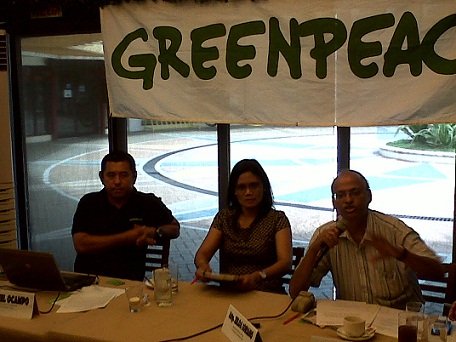By JONATHAN DE SANTOS
THE country’s organic farmers could lose access to international agricultural markets if their crops are continually exposed to genetically modified crops which are a source of pollen contamination.
This is what happened to corn farmers in Alfonso Lista town in Ifugao province when a contract for them to supply organic corn to Japan was canceled, said Daniel Ocampo, sustainable agriculture campaigner for Greenpeace Southeast Asia. Buyers from Japan stopped importing the Ifugao corn when they found that crops had been contaminated by genetically-modified corn being grown in the same town.
Ocampo, speaking Wednesday at a Greenpeace press conference on the risks of allowing field testing of genetically modified organism (GMO) crops, said the organic agricultural trade has “no tolerance for contamination.”
Agriculture Secretary Proceso Alcala told reporters at the Ninth National Organic Agriculture Congress in Cebu City earlier this month that organic agriculture will allow Filipino farmers to compete with cheaper produce from the rest of the region. The Department of Agriculture has already set aside P950 million in the proposed 2013 national budget to promote organic farming.
Ocampo said, however, that “there is more to being organic than not using chemicals.”
Germany-based International Federation of Organic Agriculture Movements (IFOAM), which has been promoting an international standard for organic agriculture and which helped organize First International Organic Marketing Conference in Manila in October, considers GMOs an “inappropriate technology.”
The IFOAM Norms for Organic Production and Processing, which was released in August, prohibits “the deliberate use or negligent introduction of genetically engineered organisms or their derivatives” into an organic farm and requires farmers to protect their crops from contamination.
Tushar Chakraboty, principal scientist with the Gene Regulation Laboratory of the India Institute of Chemical Biology, said at the same press conference that that will be difficult with open field testing of GMO crops.
Citing a study that prompted the Supreme Court of India to order a 10-year moratorium on GMOs because they posed risks to health and the environment, Chakraboty said pollen from GMO crops could contaminate regular crops. A Greenpeace briefing paper on genetically modified eggplant said field testing will “undoubtedly lead to contamination.”
 Farmers of traditional crops also face the risk of contamination, Ocampo said. Tests done on white corn, a traditional staple, in Sultan Kudarat province found evidence of contamination by genetically-modified corn that contain the Bacillus thuringenesis (Bt) bacterium. The corn from Sultan Kudarat goes to bigger markets like Cebu, he said, and consumers may be unaware they may be eating genetically modified corn.
Farmers of traditional crops also face the risk of contamination, Ocampo said. Tests done on white corn, a traditional staple, in Sultan Kudarat province found evidence of contamination by genetically-modified corn that contain the Bacillus thuringenesis (Bt) bacterium. The corn from Sultan Kudarat goes to bigger markets like Cebu, he said, and consumers may be unaware they may be eating genetically modified corn.
Chakraboty warned that once regular crops are contaminated, “how can you roll back the gene flow?”
The problems that contamination bring go beyond breaking into organic agriculture markets. Chakraboty said there have been no rigorous, long-term studies on whether the protein produced by genes from the Bacillus thuringenesis (Bt) bacterium and used as a pesticide, is safe for human consumption.
“No short- or long-term study has shown that they are safe for humans, livestock, or biodiversity. And all scientific studies about the benefits of GM crops are conducted by the same companies that sell it,” he also said.
The University of Mindanao in North Cotabato, which has been field testing Bt eggplant, has said, however, that Greenpeace’s fears have no basis either. In a press statement in May, the university said “there has been no incontrovertible proof that genetically modified crops caused any disease or ruined any traditional crops. Neither has there been any perilous consequence to man, nature, environment and land.”
The Southeast Asian Regional Center for Graduate Study and Research in Agriculture in Los Baños, Laguna, has also said in an online primer on Bt eggplant that the Department of Agriculture monitors the field trials.
A briefing paper, also published by SEARCA, quotes Dr. Serge Francisco, project leader for Impact and Policy Research at the Philippine Rice Research Institute, as saying Bt eggplant offers “a ‘win-win situation’ for the environment and farmers as it has ‘few (if any) unintended environmental effects,’ better marketable yield and a lower production cost.”
Despite that, Greenpeace has demanded that the government stop the field testing of GMOs and to cancel approval for 67 GMOs already being brought to the Philippines. “Instead, they should (be) supporting ecological solutions that ensure food security and sound environment as alternatives that will guarantee a healthy, viable and sustainable agriculture to feed the country,” Greenpeace said in a statement.
The group said that aside from the threatening health and the environment, GMOs also lead to the increased use of pesticides and herbicides. Genetically modified crops also threaten farmers by “locking them into an industrial agriculture system that enables the monopoly of a few giant agro-chemical companies who have control of the seeds,” the group said.
Greenpeace filed petitions for a Writ of Kalikasan and a Writ of Continuing Mandamus before the Supreme Court in April to stop field trials of Bt eggplant. The Court issued a Writ of Kalikasan in May while hearings on the petition for the Writ of Continuing Mandamus are ongoing.

